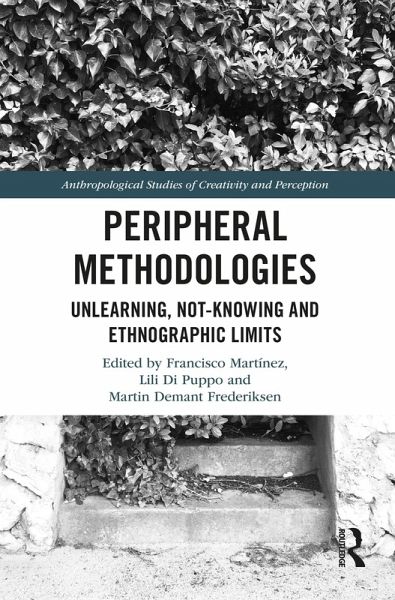
Peripheral Methodologies (eBook, ePUB)
Unlearning, Not-knowing and Ethnographic Limits
Redaktion: Martínez, Francisco; Frederiksen, Martin Demant; Puppo, Lili Di
Versandkostenfrei!
Sofort per Download lieferbar
39,95 €
inkl. MwSt.
Weitere Ausgaben:

PAYBACK Punkte
20 °P sammeln!
How does peripherality challenge methodology and theory-making? This book examines how the peripheral can be incorporated into ethnographic research, and reflects on what it means to be on the periphery - ontologically and epistemologically. Starting from the premise that clarity and fixity as ideals of modernity prevent us from approaching that which cannot be easily captured and framed into scientific boundaries, the book argues for remaining on the boundary between the known and the unknown in order to surpass this ethnographic limit. Peripheral Methodologies shows that peripherality is not...
How does peripherality challenge methodology and theory-making? This book examines how the peripheral can be incorporated into ethnographic research, and reflects on what it means to be on the periphery - ontologically and epistemologically. Starting from the premise that clarity and fixity as ideals of modernity prevent us from approaching that which cannot be easily captured and framed into scientific boundaries, the book argues for remaining on the boundary between the known and the unknown in order to surpass this ethnographic limit. Peripheral Methodologies shows that peripherality is not only to be seen as a marginal condition, but rather as a form of theory-making and practice that incorporates reflexivity and experimentation. Instead of domesticating the peripheral, the authors engage in (and insist on) practicing expertise in reverse, unlearning their tools in order to integrate the empirical and analytical otherwise.
Dieser Download kann aus rechtlichen Gründen nur mit Rechnungsadresse in A, B, BG, CY, CZ, D, DK, EW, E, FIN, F, GR, HR, H, IRL, I, LT, L, LR, M, NL, PL, P, R, S, SLO, SK ausgeliefert werden.













